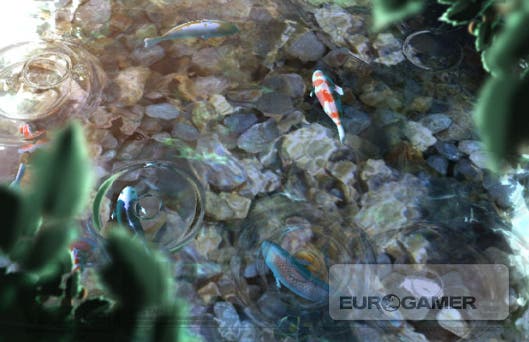Let's Tap
Thinking outside the box.
You occasionally end up tapping the box a bit too hard and doing accidental jumps in moments of desperation or fury, but that's all part of the fun. Tap Runner is ludicrously competitive in multiplayer, drawing just enough from both skill and luck to ensure that every player has a chance at winning and races can be turned upside-down at a moment's notice by one lapse in concentration. We stress-tested Let's Tap's multiplayer in a roomful of excitable Japanese students, and of all the games on offer Tap Runner proved by far the most popular, probably because it's so worryingly competitive.
Silent Blocks, meanwhile, is by far the most complex game here. It's also the most subversive - it's the game that two or three entranced people are still playing at two in the morning long after everyone else has gotten bored and gone home. There are two variants: one is a very slightly more elaborate Jenga where the velocity of your tapping affects the stability of the tower of blocks, and the other is a slow-paced puzzle game where you remove blocks from the tower to match three like-coloured ones together. It gets steadily more and more complicated - three red or blue makes copper, three copper make silver, three silver make gold and so on up to diamond - and you're in constant peril of collapsing your entire tower and losing all your progress, at which point it's difficult to hold onto the will to live, let alone keep playing.
Bubble Voyager is a little mech shooting game, more notable for its angular, retro visual style than the simple fly-and-shoot gameplay. It has a multiplayer component that weirdly resembles Asteroids - tapping sends your constantly-spinning spacecraft off in whichever direction it's facing and tapping hard launches a missile. Shooting down other players is usually more blind coincidence than skill, but it's entertaining nonetheless.
The collection is rounded off with Visualiser, which is a more concept piece than mini-game. You cycle through various scenarios and accompanying music - a cityscape, a canvas, a pond - and tapping produces different effects, creating ripples in the pond, exploding fireworks over the city nightscape or daubing the canvasses with ink or paint. The game gives you hints as to which patterns will attract enormous fish or other special effects if you can read kanji, but Visualiser is there to show how accurately the tapping works rather than to attract hours of your attention.

Obviously, Let's Tap's simplicity means that people who barely understand videogames can play and enjoy it perfectly well. But accessible as it is, the long-term gamer in us still finds Let's Tap compelling because of the minimalism of the design, and the purity of the concept; the games are built around simple, addictive arcade competitiveness. Tap Runner and Bubble Voyager especially have a real retro-SEGA appeal to them, but Let's Tap feels new and innovative - it's a great example of how a new control method can reinvigorate game concepts as old as videogames themselves, and hook a new audience on them. There's something wonderfully heartening about it.
Of Let's Tap's five offerings, one is essential, two more are excellent, and all are inspired examples of minimalist and creative game design. We can only hope that decision to present five perfectly-rounded little slices of action rather than a grab-bag of duds, filler and occasional flashes of brilliance will inspire other developers to do this same. This sits alongside Wii Sports as one of the few worthwhile and interesting mini-game compilations in existence, and as a multiplayer classic for the platform. Can we have it in Europe please, SEGA?
To which SEGA's answer is "Yes, we can!" For the moment though, Let's Tap is available exclusively for Wii in Japan, ahead of its western release this summer.
